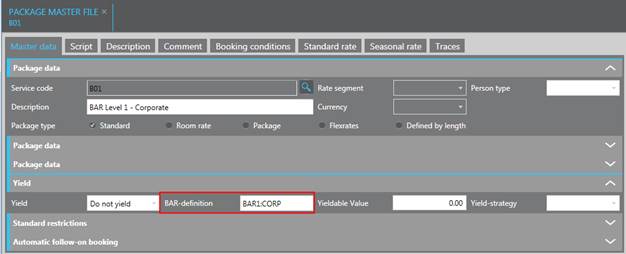
In order to setup the BAR-levels for each container, including the base-BAR-container, determine their prices for each level and category. For example:
|
BAR-container: Corporate clients | ||
|
BAR-level |
Single room |
Double room |
|
1 |
75,00 |
90,00 |
|
2 |
102,00 |
129,00 |
|
3 |
134,00 |
166,00 |
A separate package master file is set-up for each BAR-level with the following settings:
•Manual rate: no
•Yield: do not yield or blank
If the BAR-rates are subject to a hurdle is determined in the container
•BAR Definition:
Enter the BAR-level and the container it refers to, for example BAR1:CORP (see table below).
•Use in IF: leave blank
•Hide data: yes
This setting is recommended, to ensure the BAR-level is not entered in a reservation by mistake.
•There is no component list for a BAR-level, as the BAR always refers to the component list of the container.
Enter the rates for each level as usual.
TIP:
Having entered the first BAR-level,
use the Copy-function (function pane) to create
the other levels.
To link each BAR-level to its respective container, the container must be mentioned in the field BAR-definition, together with the level. For example:
|
|
Basis Container |
BAR for private, independent travellers |
BAR for corporate clients |
BAR for online reservations |
|
Container |
# |
*:PRIV |
*:CORP |
*:WEB |
|
BAR-Level |
BAR1 |
BAR1:PRIV |
BAR1:CORP |
BAR1:WEB |
|
BAR2 |
BAR2:PRIV |
BAR2:CORP |
BAR2:WEB | |
|
BAR3 |
BAR3:PRIV |
BAR3:CORP |
BAR3:WEB | |
|
… |
… |
… |
… |

Figure 6: Definition BAR-level
The link to an interfaced yield system is also established with the field BAR-definition. The same code is entered here that is used in the yield-system.